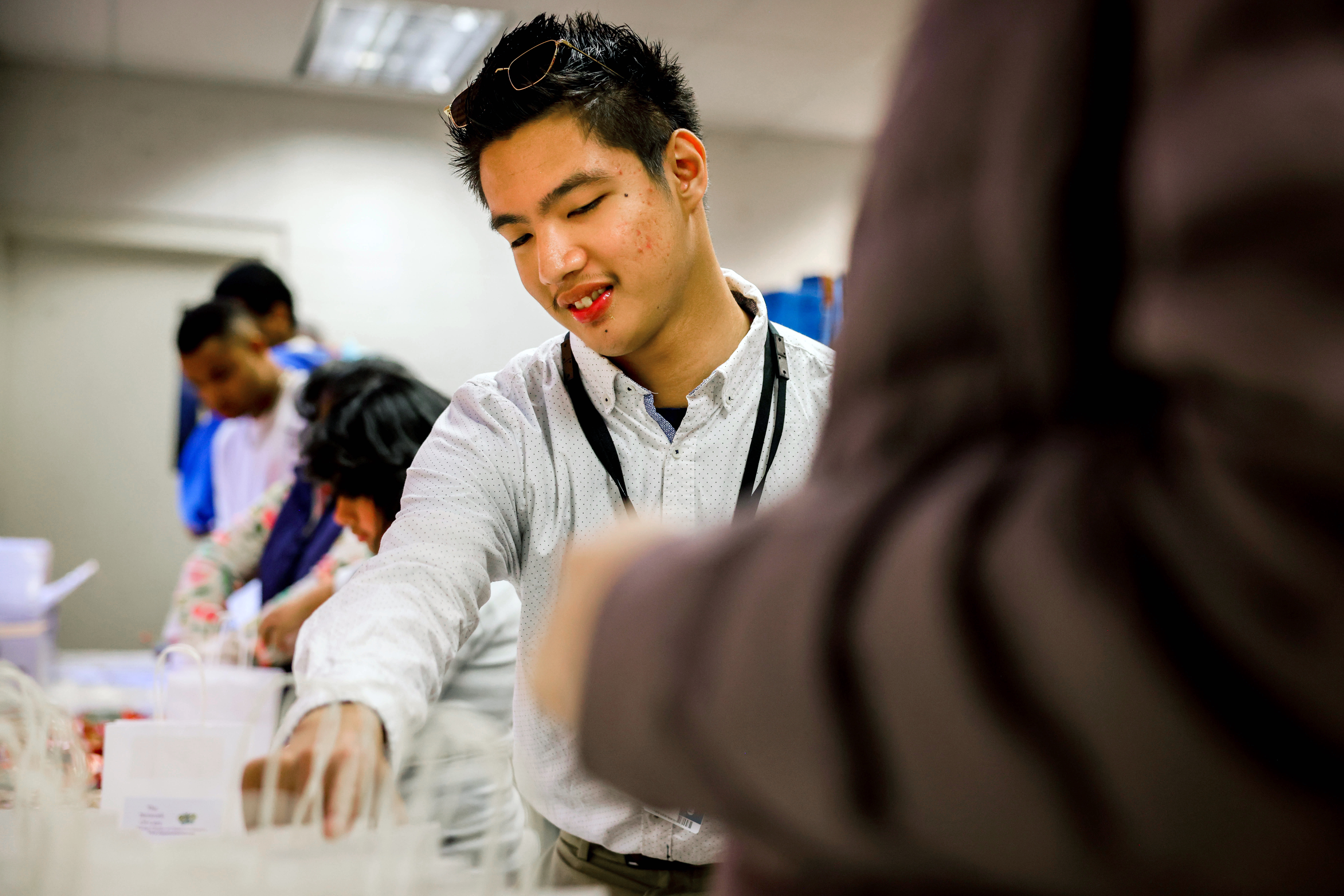Soon, the 19-year-old repeats the instructions to others in the class as they line up to form an assembly line along the tables.
“Thirty white bags,” she told one person. “No mac and cheese today. We’re leaving that out,” she instructed another. To a third, the 19-year-old said, “Let’s make sure we don’t forget the peaches.”

In a flash, the assembly line is rolling. Small white bags are filled with various non-perishable food items, including cups of noodles for soup, crackers, and granola bars. Later, teachers will take members of the class to a UPS site to mail the packages to various Bay Area hospitals.
Once there, the packages will be served — to families so deeply in the grips of an emergency involving their children that they often forget to eat. It may seem a small gesture. In truth, it’s a vital one, courtesy of The Network of Care.
The Concord-based nonprofit organization, founded by Janet Frazier in 2004, provides in-hospital meals — the assembly-line workers call them “Bags of Hope” — to feed and comfort families whose worlds have been rocked by medical crises. The various assembly lines are composed of 150-200 special needs young adults who are spread through three Contra Costa County schools.

The Network of Care is hoping to raise $18,000 through the East Bay Times’ annual Share the Spirit campaign, which provides relief, hope and opportunities for East Bay residents by helping raise money for nonprofit programs in Alameda and Contra Costa counties. The money will help pay for non-perishable food, packaging and transportation costs to provide 5,000 Bags of Hope to families keeping vigil over sick children at UCSF Benioff Children’s Hospital in Oakland; Kaiser Permanente hospitals in Oakland and Walnut Creek; Alta Bates Hospital in Berkeley and John Muir Medical Center in Walnut Creek.
“People have no idea how long they’re going to go without eating in a situation like that until they’re in it,” Frazier said. “You just kind of go on auto-pilot and forget.”
Frazier knows. Her older daughter Stephanie died at age 20 in a Dec. 16, 2000, car crash that also critically injured her 17-year-old daughter Lindsey. As she grieved one daughter and cared for another, Frazier went a day and a half without eating until a nurse shared a bite of her sandwich.
“I didn’t even realize how hungry I was,” she said, “More than that, I felt it more physically in my heart, just because somebody during that awful time for our family did something nice.”

The heart of the organization beats through the young adults on the assembly line. On a recent October day, they are overseen by Bruce Ellison, a special education teacher with Antioch Unified School District. The classes are intended to give special-needs adults from ages 18-22 life skills, so they can obtain a job.
“It allows them to build a résumé,” Ellison said. “Obviously, that’s really important. What’s more important is that you see a lot more confidence, a lot more socialization. They begin to understand a lot more about how things work.”
It becomes apparent as the assembly line gets rolling, with the kind of teamwork that would make any coach smile.
Bruce Tenshi Zablan beams as he loads a bag with the diced peaches and moves it on down the line. Hannibal Brannon and Jermarri Coleman put together a series of bags and exchange a handshake. Devin Garrett hands bags to Tiffany Wash, who then staples them together.
Wash and Dakota Miller then tape up the shipping boxes and get them ready for travel.
“It’s fun,” Martinez said. “We all get to do everything. You learn a lot.”
Indeed, the organization runs like a small little business. The needs and orders are different each day, along with the roles that each person may fill on the assembly line.
“I believe one of the things the students get the most out of it is that they get a real sense of belonging,” Ellison said. “That’s really something you can’t put into appropriate words.”

Nevertheless, Frazier tried.
“You see them discover confidence, and then gain confidence and then live more confidently,” she said. “It’s all because they’ve accomplished this, because they got to work as part of a team and because that team was doing successful things. That’ll change anyone.”
The gesture of needed nutrition on that awful 2000 night changed Frazier, who said she never forgot it. What started as “just one of those ideas that pops into your head” during an excruciating time in her life has grown into an organization that has provided food for 340,000 families and more than 50 hospitals throughout the state.
Providing comfort and nutrition to other families, she said, has healed her in a way that she could not have imagined when she was in the middle of tragedy.
“After it happened, my heart was just shattered,” she said. “But as this grew, every time I saw a bag get packed or heard stories of a family receiving one, the whole process of it slowly put my heart back together. The healing took place every day. When I look at the huge impact to the families and students, it heals my heart all the stronger.”
It also has allowed her to feel joy again.
“To go from that pain to be able to smile because you’re helping others and coming full circle,” Frazier said. “That’s a miracle.”
